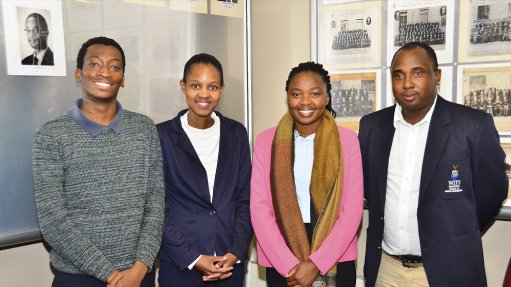
The Wits post-graduate students carrying out their Masters work at South Deep (from left to right): Rachidi Dineo, Mosebudi Matlou, Matsobane Nong and Isaac Mabala. Ms Nong and Mr Mabala are also Associate Lecturers at the Wits Mining School
Mining students at the University of the Witwatersrand (Wits), with the support of gold miner Gold Fields, are building South Africa’s capacity to apply mechanised mining methods and supporting technologies in deep-level gold mines.
Various research projects are under way at both post graduate and undergraduate level in the Wits School of Mining Engineering as part of a three-year partnership between the university and the gold miner.
The work tackles challenges and opportunities at Gold Fields’ South Deep mine.
The partnership is supported by a R6-million grant pledged by Gold Fields in 2017, and follows on the back of a recognition by Wits and Gold Fields that South Africa lacks the sufficient skills and expertise to run deep-level mechanised operations.
Wits School of Mining Engineering head Professor Cuthbert Musingwini says young researchers play an important role in finding economically viable strategies to mine South Africa’s deep deposits.
“These partnerships between academia and industry can make our deep-level mines more safe and sustainable, continuing their vital contribution to the economy,” he notes.
Gold Fields CEO Nick Holland, meanwhile, emphasises the school’s long history of research-intensive higher education, as well as Gold Fields’ association with the digital technology-focused Wits Mining Institute. This, he says, makes Wits the “natural partner for Gold Fields’ vision for South Deep”.
“Deep-level mining in South Africa will only be sustainable in the long run if it’s done in a mechanised manner. The School of Mining’s new focus on deep-level, mechanised mining research points the way,” Holland avers.
RESEARCH
A number of the post graduate applied research projects are well advanced and are covering topics that have the potential to positively impact on South Deep in terms of safety, productivity and cost improvement as the mine continues its production ramp-up.
Focus areas for the various projects at South Deep, which will lead to Masters degrees for the post graduate students, cover a range of areas, including the assessment of the local ground support and corrosion life cycle to improve long-term cost-effectiveness by Rachidi Dineo; the analysis and optimisation of the ore flow system from stope to mill by Matsobane Nong; research to increase the effectiveness of backfill in the mining value chain by Mosebudi Matlou and multiple point simulation for reducing uncertainty in orebody modelling by Isaac Mabala.
A project to assess opportunities to facilitate cost-effective communications right to the mining face, to complete the “connected mine”, has also recently been initiated.
Other ongoing research at postgraduate level, linked to achieving improved safety and productivity in deep-level mining, is carried out under Professor Rudrajit Mitra, the School’s chair of Rock Engineering.
Six undergraduate research projects have so far been conducted by third- and fourth-year students as part of the vacation work degree requirement.